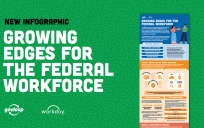Digital government is big in Washington. Next year, the White House plans to spend $35 million more on the US Digital Service, $105 million for digital services teams at 25 agencies, and tens of millions more for digital channels throughout the federal government. And that’s just the latest tranche, piled atop hundreds of millions in digital government spending in recent years.
Unfortunately, it looks like federal agencies are more excited about digital government than the public is. As I detail in my recent report, “Washington Must Work Harder To Spur The Public’s Interest In Digital Government,” public interest in digital government is tepid at best. In fact, a Forrester survey shows that only two-fifths of the public agrees that the federal government should focus on offering more digital services. And the news isn’t any better for specific big digital initiatives that are getting many agencies excited. For instance, only two-fifths of the public is interested in a single sign-on credential for federal websites and less than a third of people want federal mobile apps that tailor safety alerts and other government information to the user’s location.
Why is public interest in digital government so weak? I go into greater detail in my report, but the bottom line is that people:
- Don’t have good experiences with digital government as it exists. For instance, our surveys shows that fewer than half of Americans consider federal websites easy to use or well-organized and only about half of the public considers their content relevant or professional-looking.
- Don’t trust the government. Only about a third of the public trusts the federal government with their personal data and over half of people who don’t want single sign-on or other high-profile digital government services cite privacy as a reason.
- Don’t know how additional digital government services can benefit them. Nearly half of people who reject single sign-on and location-based services said that they didn’t understand the purpose. Misperceptions are common, too. One-fourth of those who opposed single sign-on thought it would be inconvenient.
So what are federal agencies to do about this? To boil down the more detailed advice I offer in my report:
- Win converts by improving existing digital customer experience before expanding it. When people have better experiences with the digital government channels they use now, they will be more willing to support new ones in the future. To determine exactly which components of their digital channels they should alter to improve effectiveness and ease, agencies should conduct detailed driver analyses using our Customer Experience Index or a similar methodology like the Net Promoter Score.
- Stop wasting time and money on the most underused digital channels.Federal agencies should study why each channel is underused and then decide whether to market it more extensively, migrate its information or services to another channel, or stop offering its content entirely. For example, US Embassy Port Louis’ YouTube channel has had only 18 subscribers and less than 3,500 views since June 2012. It could be that customers would flock to it if they knew about it, there’s another channel that customers would prefer for the same content, or customers don’t want that content at all.
- Explain the benefits of new digital channels. Don’t just assume that people will flock to every new digital channel, and don’t count on every quirky new channel to get free advertising from giddy tech media. Use real marketing campaigns to explain how each new digital channel will benefit the public.
Those are three big jobs, but they are just a start. To avoid wasting millions in taxpayer dollars on government digital experiences that people don’t want, federal agencies must fundamentally rethink not only their digital CX offerings, but their entire CX ecosystems. More on that next week!
Rick Parrish is part of the GovLoop Featured Blogger program, where we feature blog posts by government voices from all across the country (and world!). To see more Featured Blogger posts, click here.





Leave a Reply
You must be logged in to post a comment.